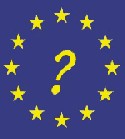
|
Stars and gripes |
Declaration of interdependance
Europe's countries should be happy to work together. Not because of globalisation, but because it is better fun that way.
"Neither for nor against” (“Ni oui - Ni non”) was how former French president Mitterrand once famously characterized his view on privatization. This time, after the French and Dutch referenda on the European treaty, I have adopted a Oui-Non view. And it seems to be a common feeling, even for pro-Europeans like me. It did not take me long to get over my initial anger and depression after the No vote (see Duped/Trompé). Why did I feel that way? Why have I tempered my opinion?
Time, and thought, I guess. This was more than just another lesson in democracy. No, the French vote brought out the niggling doubts in all of us. Not about Polish plumbers–that was media hype affecting a small percentage of the vote: Poland’s workers are as welcome here as Chopin was. Nor was this a victory of the left against reform, or of the populist or xenophobic right against Europe. It was a mixture, but these were marginal issues in the cocktail. More important was a string of concerns on the minds of ordinary voters, mostly pro-European, but who were starting to feel that they were being had. They decided to call "time out".
The 1-euro charge on prescriptions; outsourcing by profitable firms; enlargement without further deepening; ministers grimly warning against alternatives, while dipping into public money to rent luxury Parisian apartments; price rises under the euro: like any good recipe, no ingredient stood out yet all blended into an overall flavour of doubt that has tainted Europe in recent years.
To be told there was no alternative, no "plan B", was patronising. In many other countries, the people might have been herded into their pens by such talk. But not the French, who know more than most how to keep their governments in line. So, they politely said Non.
The French didn’t climb off the euro-constitutional train, but reaffirmed their role as co-drivers, and pulled the stop chord.
French political leaders on the pro-Yes side may have run a poor campaign, but Europe was the issue on the table, and must take the blame. Okay, the vote opened up that tiresome debate about the virtues of the deregulated anglo-saxon model over the continental-type social market, with slow growth and high unemployment used as evidence. But thankfully, Europe is not an economic experiment or special investment zone, but a social, economic and political contract.
True, its lofty goals have not been helped by joblessness, but gloom and doom by our leaders about globalisation and the need to face off competition from China rubbed salt into the wounds. Even if the Non camp agreed that French labour legislation needs to change, to go from there to privatising everything from healthcare to education, even transport, was “too much”.
Anyway, a European project based on markets alone would be like building a Maginot line in the global economy. The French know this better than anyone. That is why building social, political and cultural space is so vital.
As for Brussels and institutions, I respect them. It is not an oversized bureaucracy, but an efficient one. But it is a bureaucracy. Of course, Europe's institutions can function, but this misses the point, while it shows a democratic deficit and reinforces the remote technocratic image of the place. Surely the question is: how can Europe be made more legitimate again, friendlier, closer to the people? Frankly, if the French of all folk can't support this Europe any longer, there is indeed a risk of failure.
France and Holland have to be on board. Why would Poland want to be in a Union without France and dominated by Germany? Why would Germany? It defeats the purpose.
Here are a some steps that might get Europe back on track.
- First: deepen Europe before further enlargement. We have learned the lesson.
- Second, Brussels must decentralise and open itself up to more accountability, with local European elections, and why not, a new European party transcending national politics.
- Third, we should have European taxation, directives and cooperation are not enough, as outsourcing shows.
- Fourth, Britain should help out and quit gloating about France's difficulties, which at least has had the nerve to adopt the euro and go for a referendum.
- And fifth, there should be no new constitution, but rather, an Irish-like Declaration of Interdependence.
Whether Ireland would vote yes is uncertain. It has benefited from the EU, but as it shares core European ideals, it will take the French vote seriously.
Oui, there is a Europe, beyond the glorified business park model. And Non, we are not back to the drawing board, because we never really left it.
©RJ Doyle, Paris, France 2005
blog comments powered by Disqus